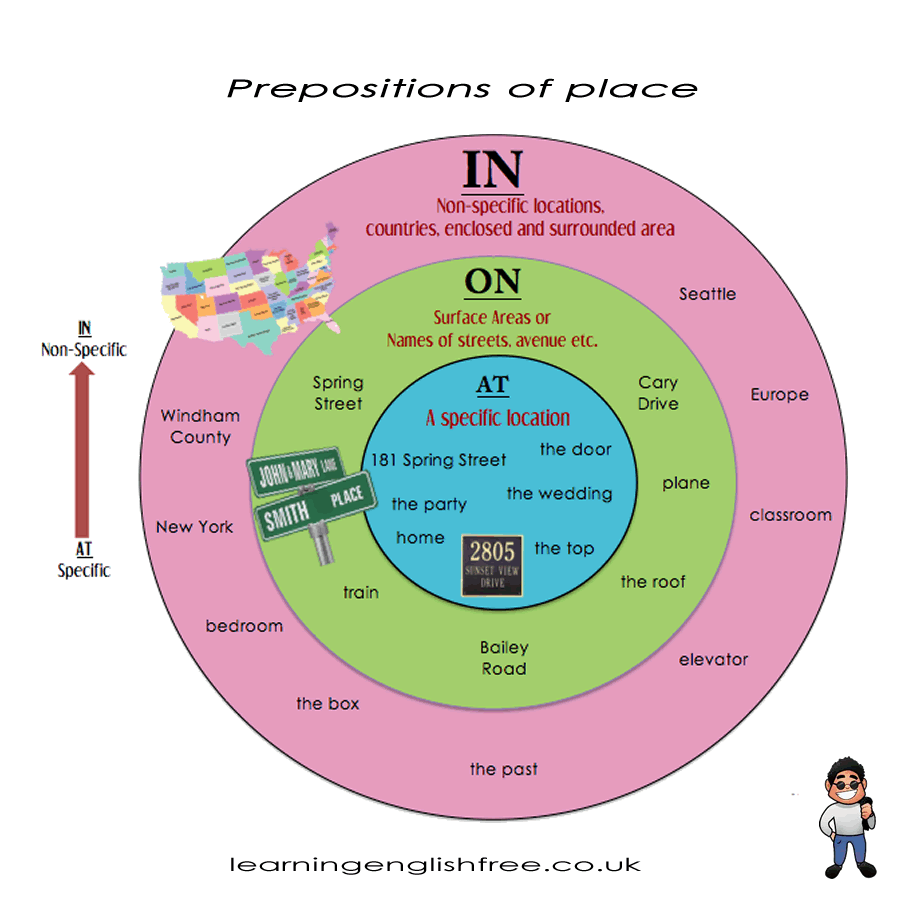
What do prepositions of place mean?
Prepositions of place are words we use to show where something is. Think of them like pointers in language. They help us tell others where things are. For example, when we say, "The book is on the table," the word "on" is a preposition of place. It's important to know these words to tell people where things are clearly.
Why Prepositions of Place Matter
Content: These words are really important because:
- They make our meaning clear: They help us tell others exactly where something is.
- They help us picture where things are: When someone uses these words, we can imagine the place or thing they are talking about.
- Knowing them helps us speak and write better: Using these words correctly makes us better at English.
IN
Used for non-specific locations, countries, enclosed areas, and larger geographical areas.
- Countries/Regions: Europe
- Counties: Windham County
- Cities: New York, Seattle
- Enclosed Areas: the box, the past, the elevator, the bedroom, the classroom
ON
Used for surface areas, names of streets, avenues, etc., and specific smaller geographical areas.
- Streets/Avenues: Spring Street, Cary Drive, Boley Road, 181 Spring Street
- Specific Locations: the roof, the top, the door
AT
Used for a specific location or address and very specific points or events.
- Specific Addresses: At Oxford Street
- Events/Places: The wedding, the party, the home
- Other Specific Locations: the train, the plane
Note: Some items can fit into multiple categories depending on the context. For example, "the party" could be "IN the party" when referring to being inside the event space, "ON the party" is less common but might be used in some idiomatic expressions, and "AT the party" when referring to attending the event. Similarly, "Europe" can be used with "IN" to denote being within the continent and "ON" in some contexts, like "on the European continent."
The use of prepositions in English can sometimes vary based on regional differences or specific expressions.
How to use prepositions of place in a sentence
IN
- Europe: "I have always dreamed of travelling in Europe."
- Windham County: "She lives in Windham County."
- New York: "They visited the famous museums in New York."
- Seattle: "Coffee culture is big in Seattle."
- The Box: "He found an old photo in the box."
- The Past: "Inventions in the past have shaped our world."
- The Elevator: "We got stuck in the elevator."
- The Bedroom: "He was reading a book in the bedroom."
- The Classroom: "There is a new student in the classroom."
ON
- Spring Street: "The parade will take place on Spring Street."
- Cary Drive: "They live on Cary Drive."
- Boley Road: "There's a new store opening on Boley Road."
- 181 Spring Street: "Her office is located on 181 Spring Street."
- The Roof: "We watched the stars on the roof."
- The Top: "There was a beautiful vase on the top of the shelf."
- The Door: "Please knock on the door when you arrive."
AT
- 2805: "Meet me at 2805, the address of the new café."
- The Wedding: "We had a great time at the wedding."
- The Party: "I saw many old friends at the party."
- The Home: "They will host the meeting at their home."
- The Train: "She read her book at the train station while waiting."
- The Plane: "He fell asleep at the plane during his flight."
Each sentence demonstrates the use of the prepositions "IN," "ON," and "AT" with different locations and contexts, making it easier to understand how they are applied in everyday English.
Using Prepositions of Place Well
To finish, prepositions of place are not just grammar; they help us talk about where things are. When we use them right, we can make it easy for others to understand where something is. Learning and using these words helps us share ideas about places and things around us.
This version uses simpler language, making it more suitable for learners of English at different levels.
